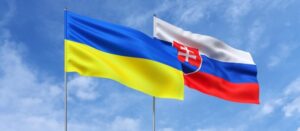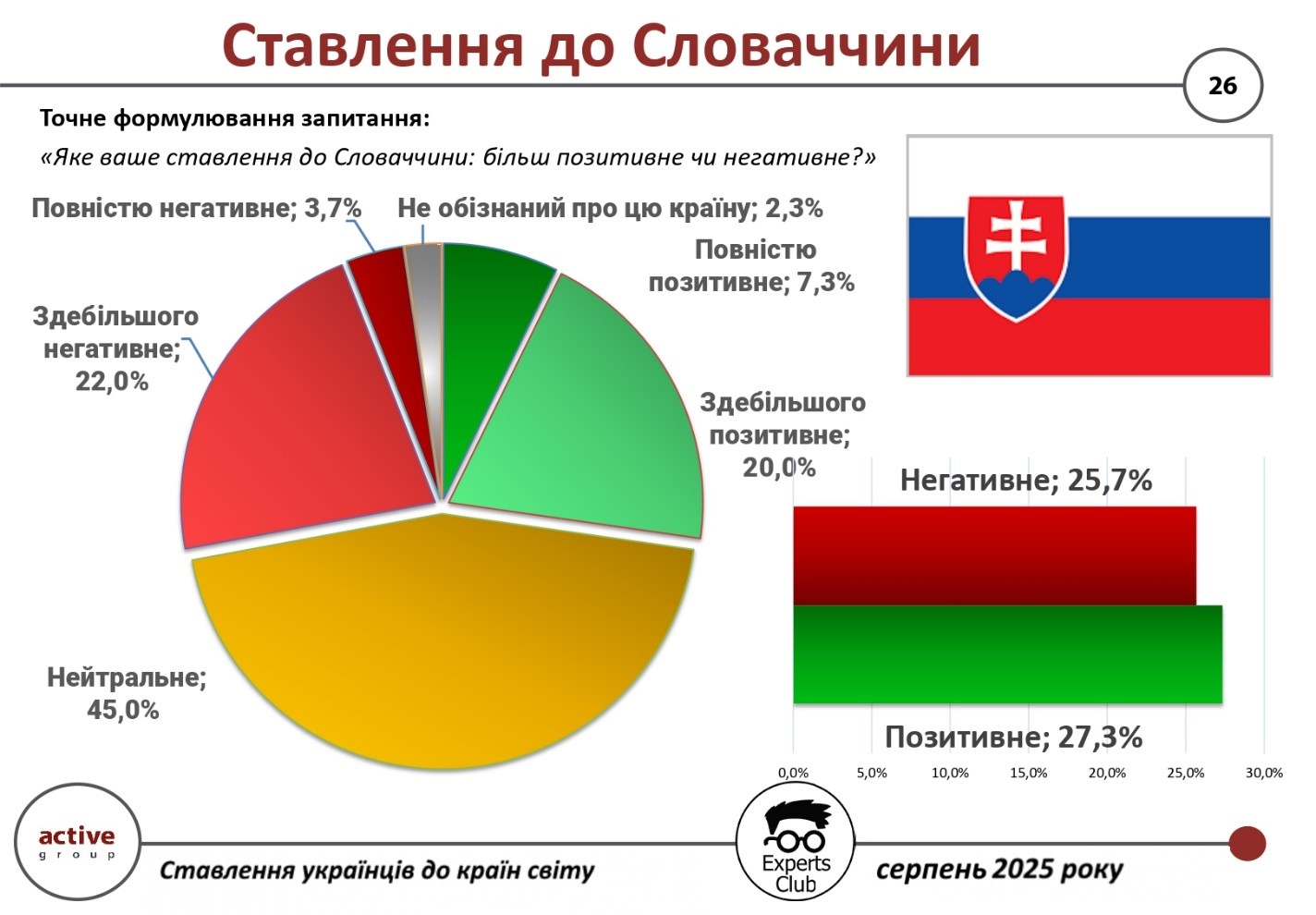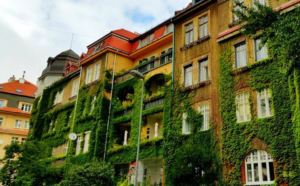

A sociological survey conducted by Active Group in cooperation with the Experts Club think tank in August 2025 showed that Ukrainians’ attitudes toward Slovakia are quite controversial.
According to the results, 27.3% of respondents demonstrated a positive attitude toward this country (20.0% – mostly positive, 7.3% – completely positive). At the same time, 25.7% of Ukrainians expressed a negative opinion (22.0% – mostly negative, 3.7% – completely negative). A significant part of citizens – 45.0% – remain neutral, and another 2.3% said they do not have enough information about Slovakia.
“We observe a kind of balance between positive and negative perceptions of Slovakia. On the one hand, there is historical and geographical proximity, cultural contacts, and on the other hand, tense moments in the political dialogue in recent years. This creates an ambiguous picture,” explained Oleksandr Poznyi, co-founder of Active Group.
In his turn, Maksym Urakin, founder of Experts Club, drew attention to the economic dimension of bilateral relations.
“In the first half of 2025, the trade turnover between Ukraine and Slovakia amounted to more than $1.48 billion. At the same time, exports from Ukraine amounted to $483.7 million, while imports from Slovakia amounted to almost $999.1 million. The negative balance of more than $515 million indicates an imbalance in trade, which also affects the public perception of the country,” he emphasized.
The survey was part of a broader study of international sympathies and antipathies of Ukrainians in the current geopolitical context.
The full video can be viewed here:
https://www.youtube.com/watch?v=YgC9TPnMoMI&t
You can subscribe to the Experts Club YouTube channel here:
https://www.youtube.com/@ExpertsClub
ACTIVE GROUP, DIPLOMACY, EXPERTS CLUB, Poznyi, SLOVAKIA, SOCIOLOGY, TRADE, URAKIN

The Relocation.com.ua project has prepared a fresh overview of the Slovak housing market (in the first half of 2025) in three sections — prices/sales, rentals, and construction:
Prices and sales continued to grow. In Q2 2025, the average price of residential real estate in Slovakia rose to €2,777/m², which is +12.8% y/y (and +2.9% compared to Q1). This is a new historical maximum according to NBS data. In Q1, the figure was €2,700/m² (+11.4% y/y). Growth is synchronous for apartments and houses, faster in large cities and regional centers.
The capital has seen a sustained upturn: according to media market data, in Q2, the average price of apartments approached €3,100/m², exceeding the peak of 2022 (the old housing stock is growing faster than new construction).
After a weak Q1 (due to the effect of the VAT increase from 20% to 23% from 2025), Q2’25 in Bratislava showed a sharp rebound — ~797 new buildings sold, which is +60% q/q and the second-best result in four years. For the whole of 2024, sales of new buildings in the capital doubled (1,664 vs. 773 in 2023) — part of the demand was “carried over” due to VAT.
The cost of local mortgages continues to normalize: the average rate for residential loans with a 5–10-year fixed term in June was ~3.0%, which supports solvent demand.
The rental market in 2025 is “cooler” than the price market. The supply of apartments for rent has increased, and average rates in a number of regions have been adjusted downward. At the same time, Bratislava remains the most expensive: the average rent is ~€890/month; the most affordable region among the large ones is Trenčín (~€544/month). There is a significant spread across the capital’s districts.
The gross rental yield in the country is about 4.9% (Q2’25); a year ago it was ~5.3%: profitability is slightly “eaten away” by the outpacing growth in purchase prices.
Housing construction is slowing down: in Q1 2025, 3,119 apartments/houses were completed — the lowest number in 9 years, −24% y/y (data from the State Statistics Office). This is the result of a weak flow of starts in 2023–2024 against the backdrop of expensive money and regulatory uncertainty.
It should also be noted that on April 1, 2025, a new Construction Law came into force, combining zoning and permitting into a single procedure designed to speed up the issuance of permits and reduce bureaucracy. The effect on the statistics of permits and completions will gradually become apparent in the second half of 2025–2026.
By mid-2025, Slovakia will be a “seller’s market” in terms of prices and a “tenant’s market” in terms of rents: prices will reach new highs amid cheaper mortgages and limited completions, while rents will stabilize due to increased supply.
If current trends continue, annual price growth is likely to slow down by the end of the year, but levels will remain high and housing supply will remain below pre-crisis levels.

Slovakia is ready to allocate approximately EUR 84 million in loans and grants for the implementation of projects to restore and develop the infrastructure of NEC Ukrenergo.
The company announced this on Friday, citing investment director Oleg Pavlenko.
“In particular, we are talking about the construction of a new high-voltage line in a region that has been severely affected by Russian shelling, the construction of a new Ukrenergo substation, and the reconstruction of an existing one,” he said.
According to Pavlenko, the implementation of each of these initiatives is very important for the system operator, as these measures will significantly strengthen the stability of the Ukrainian energy system.
UkrEnergo executives discussed the implementation of joint projects and the possible participation of Slovak businesses in the restoration of Ukraine’s energy sector with representatives of the Slovak government. In particular, they discussed attracting infrastructure investments under the European program to support Ukraine, Ukraine Facility.
The implementation of projects to restore Ukraine’s energy infrastructure with the support of Slovak partners will be administered by the Export-Import Bank of the Slovak Republic and the Slovak Development Agency with the assistance of the country’s government.

Ukraine has started importing gas via Slovakia, according to a Facebook post by Serhiy Makogon, former head of the Ukrainian Gas Transmission System Operator (OGTSU).
“Previously, imports came from Hungary and Poland, but the cheaper Hungarian route is already fully loaded, so suppliers are forced to buy more expensive capacity from Slovakia,” he wrote.
According to the former head of GTSOU, the average daily import is currently around 14.5 million cubic meters, but in order to accumulate 13.6 billion cubic meters by November 1, imports need to be increased by 2-3 times. At the same time, Slovakia has the largest import capacity – 42 million cubic meters per day.
As reported with reference to Makogon, in order to achieve last year’s planned targets for gas reserves in underground storage facilities (UGS), Ukraine needs to import at least 5 billion cubic meters by November 1, i.e., approximately 870 million cubic meters per month or 29 million cubic meters per day.
He noted that $2-2.5 billion is needed to import the minimum 5 billion cubic meters, of which $0.4 billion has already been provided by donors and may be provided further. At the same time, he believes that funds for gas purchases can also be found within the country, in particular from the budget through direct recapitalization of Naftogaz or through debt repayment schemes involving mutual settlements.
According to Gas Infrastructure Europe (GIE), Ukraine switched from gas withdrawal from underground storage facilities to gas injection on April 17. According to them, this season’s withdrawal lasted from November 1, when there were 87.037 TWh (8.315 billion cubic meters) in UGS facilities, and ended on April 16 at 7.062 TWh (0.675 billion cubic meters) – the lowest level in history.
GIE indicates that this year Ukraine ended the heating season with reserves at 2.22% of the maximum UGS capacity, while last year the withdrawal season ended on March 30 with reserves of 11.12 TWh (3.388 billion cubic meters), or 11.12% of the UGS capacity.
In turn, according to former Energy Minister Olga Buslavets, the total level of natural gas reserves in Ukrainian UGS facilities at the end of last week was 6.1 billion cubic meters (including 4.7 billion cubic meters of “buffer gas”), which is 31% lower than last year.
Over the past week, net gas imports to Ukraine (excluding short-haul) averaged 14.4 million cubic meters per day (from Hungary and Poland), while daily gas consumption in Ukraine rose to 30-33 million cubic meters per day, according to the European platform. per day (from Hungary and Poland), while daily gas consumption in Ukraine increased to 30-33 million cubic meters per day, which, according to the European platform
Agregated Gas Storage Inventory (AGSI), allows no more than 27 million cubic meters per day to be pumped into UGS facilities.

The State Service of Ukraine for Food Safety and Consumer Protection (SSUFSCP) has imposed a ban on the import of animals from Slovakia to Ukraine due to the outbreak of foot-and-mouth disease in that country, the agency’s press service reports.
At the same time, it referred to official information from the European Union (through the Animal Disease Information System – ADIS) and the World Organization for Animal Health (WOAH).
“The import of animals susceptible to the foot-and-mouth disease virus, genetic material, raw materials and products from them to Ukraine from the Slovak Republic is prohibited,” the statement said, citing an order from the Chief State Veterinary Inspector of Ukraine.
The source of infection is animals with foot-and-mouth disease and those in the incubation period. The virus can be transmitted, in particular, through food from animals susceptible to the disease.

Slovakia will hold a series of talks starting next week to secure gas supplies from Russia after its current transit contract, which involves Ukraine, expires at the end of this year, Reuters reported on Friday, citing government officials.
“In the coming days, in particular during the Christmas holidays, you can witness extremely intense negotiations at different levels and in different countries, which will begin next week,” Slovak Prime Minister Robert Fico said at a press conference.
Denisa Sakova, Deputy Prime Minister and Minister of Economy of Slovakia, said that the talks would involve the European Commission, Ukraine and EU member states.
Fico said that he sought to ensure the continuation of supplies from the east to avoid additional fees for gas transit from other directions. “We see no reason to pay more for gas than necessary for geopolitical reasons… I believe that even if there is a short-term interruption of supplies from the east, we have enough reserves to find a common solution for several EU countries, and we will keep gas transit through Slovakia, as well as gas transit through Ukraine,” he said.
Reuters notes that Slovak officials have been looking for alternative gas transit schemes through Ukraine that would not require a direct agreement between Ukraine and Russia, but have not reached any agreement.
Slovakia reportedly has a long-term contract with Russia’s Gazprom and would like to keep importing Russian gas through Ukraine, but it will end at the end of 2024, as Ukraine does not plan to extend the transit contract with Gazprom.
Earlier, Hungarian Foreign Minister Péter Szijjártó said that Hungary and Bulgaria had found a legal and financial solution acceptable to the parties to continue the transit of Russian gas through their countries in the face of US sanctions against Gazprombank.
Hungary receives Russian gas through the Turkish Stream pipeline from Russia to Turkey and then transits through Bulgaria to Hungary. Hungary has received the bulk of its gas consumption through this route – this year, more than 7 billion cubic meters.
At the same time, Bloomberg, citing the Bulgarian Ministry of Energy, reports that “only a ‘solution’ to the problem was discussed, which would include Hungary and allow Bulgaria to continue receiving transit fees after the arrival of Russian gas.” Bulgaria has previously warned that it may stop transiting Russian gas to Central Europe if Gazprom does not find a payment solution, the agency reminds.